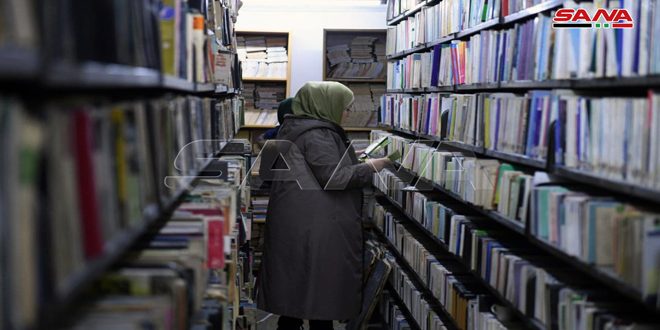The National Library of Aleppo has regained its brightness and role as a key edifice of knowledge in Syria after the rehabilitation and restoration works to fix the damage caused to this library because of terrorism have been completed.
Director of the Library Mohammad Hijazi told SANA reporter that the library has been the most important ancient cultural edifice in the city of Aleppo where writers, poets, thinkers and university students used to spend long hours of their time to get knowledge, enjoy reading and do research works.
According to Hijazi, the library was first established in the Khan Al-Jumruk area in the 1920s. Its first director was the historian Kamel Al-Ghazzi. In 1935, a decision was made to build this library in its present location in the old city. The foundation stone was laid to the library in 1937 and the building process was completed in 1945. The library’s first director in this location was the renowned Syrian poet Omar Abu Risheh.
The library was supplied with books by the then Ministry of Education through direct purchase and exhibitions and now it contains 100,000 books as well as Arab and international newspapers, magazines and periodicals.
 Hijazi added that an all-out maintenance process was conducted for the library in 2011, but after completing the restoration work, the library was the target of repeated shelling by the terrorist groups in Aleppo causing to it massive damage, yet it continued to organize cultural activities and events.
Hijazi added that an all-out maintenance process was conducted for the library in 2011, but after completing the restoration work, the library was the target of repeated shelling by the terrorist groups in Aleppo causing to it massive damage, yet it continued to organize cultural activities and events.
He went on to say that with Aleppo’s liberation from terrorism in 2016 and the restoration of security to the city, the government planned to start a rehabilitation project in different parts of the city. In 2018, a project to restore the upper part of the library, which includes the book store, the reading room, Omar Abu Risheh hall and the administration rooms, was implemented. This project was followed by another one that involved the theater as well as the electricity and water networks.
Hijazi explained that the ground floor contains a theater with a capacity of 300 seats, a reception room and a reading room. It also includes a board of honor, which contains the names of the most famous writers and poets who led this cultural edifice, including Kamel Al-Ghazzi, Omar Abu Risheh, Sami Al-Kayyali and Mahdi Al-Mallah.
 He pointed out that prominent Arab writers and intellectuals lectured in this library, most notable of who were Taha Hussein, Mohamed Hassanein Heikal, Ahmed Amin, Abbas Mahmoud Al-Akkad, Bint Al-Shati, Omar Abu Risheh, Muhammad Mahdi Al-Jawahiri and Suleiman Al-Issa.
He pointed out that prominent Arab writers and intellectuals lectured in this library, most notable of who were Taha Hussein, Mohamed Hassanein Heikal, Ahmed Amin, Abbas Mahmoud Al-Akkad, Bint Al-Shati, Omar Abu Risheh, Muhammad Mahdi Al-Jawahiri and Suleiman Al-Issa.
According to Hijazi, the upper part of the library includes poet Omar Abu Risheh hall with a capacity of 40 visitors, and which is dedicated for postgraduate students, researchers and university professors. It also includes a general reading room that can host 150 visitors, in addition to a book store that contains 100,000 old and modern books, newspapers and magazines.
Hamda Mustafa

